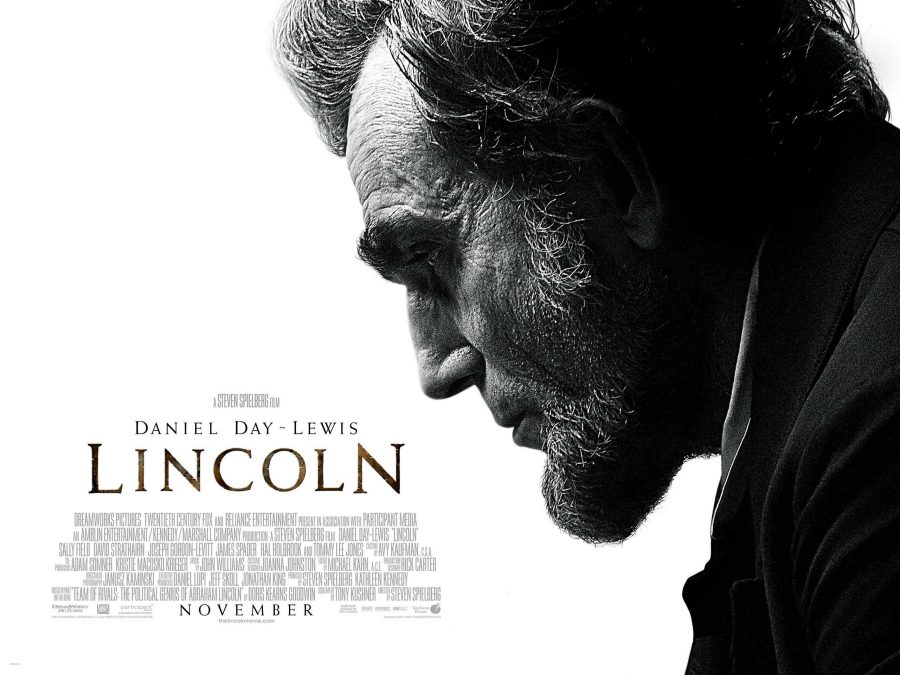
In general, biographies of big historical figures are avoided today, with filmmakers usually choosing to highlight only a specific event in the person’s life. We’ve seen it recently with films like “My Week With Marilyn,” “Frost/Nixon,” or “A Dangerous Method.” Steven Spielberg has chosen the same idea for his film about our 16th president, focusing on the events leading up to the ratification of the 13th amendment. But it seems like the film can’t decide if it wants to be a big historical epic about freeing the slaves, or a small intimate drama about Lincoln himself. That’s not to mention countless other subplots, some of which work and some of which feel very unnecessary. Though some plots seem unnecesary, it manages to overcome its lack of focus and still be an engaging, entertaining drama, despite not being quite the insight into Abraham Lincoln you may have wanted.
As the film starts, Lincoln (Daniel Day-Lewis, in another one of his magnificent and transformative performances) has just entered his second term, mid-civil war and struggling to get support even from his own cabinet. He faces the challenge of trying to convince Congress to ratify an amendment to the constitution that will get rid of slavery in America. However the only way to convince Congress to vote “yes” is if they think that freeing the slaves is the only way to end the war with the South, when in reality, the South is very close to agreeing to a compromise. It’s very much a movie about the game of politics, as Lincoln sends out subordonnants to try and convince congressmen to vote for the amendment. I oddly even see it as a sort of companion piece to 2009’s “In the Loop” (which is a much better film) but is set in today’s government and focuses on people taking sides, trying to trick others, and the game of politics as a whole.
What really surprised me about “Lincoln” was that it’s a really funny movie. It may not be a political satire like “In the Loop,” but still has a lot of comedy that sets it apart from a typically stuffy historical drama. The big unexpected standout of the film is Tommy Lee Jones as congressman Thaddeus Stevens, who one could even argue is the best part of the film, eclipsing Lincoln himself.
However for “Lincoln,” it’s biggest problem was just a lack of focus on Abraham Lincoln. Daniel Day-Lewis is magnificent as Lincoln, completely transforming himself into the man, but the screenplay by Tony Kushner spends at least half of its time on other supporting characters besides him, and really loses focus on the man we came to see in the movie. There are extraneous plot lines with Lincoln’s three sons, many of whom Lincoln sends out to convince the congressmen, and then the congressmen themselves.
At the same time, Spielberg has filled that script up with one of the most massive casts ever assembled, it seems as if every speaking role is taken by some great actor. I’m a huge fan of all the actors in the film; Daniel Day-Lewis, Tommy Lee Jones, Joseph Gordon-Levitt, David Straithairn, James Spader, Hal Holbrook, John Hawkes, Lee Pace, Jared Harris, Tim Blake Nelson, Jackie Earle Haley, Walter Goggins, Michael Stulhbarg, Dane DeHaan, the list really goes on and on. But as great as it is to see all these talents on screen, they have to feel somewhat wasted when only appearing for a moment, and saying a line or two.
Despite being somewhat unsatisfying, “Lincoln” is still an impressive assembly of talent. Spielberg is thankfully more restrained here than in last year’s “War Horse” and not getting too sentimental. The John Williams score is fairly typical, not bad but not impressive either and the cinematography is fairly standard. All of these come together for a somewhat disappointing film considering the massive potential, but still a very good movie. At the heart of the film is a great cast and often compelling story, and at the times they work, they really work.
4/5 Stars


